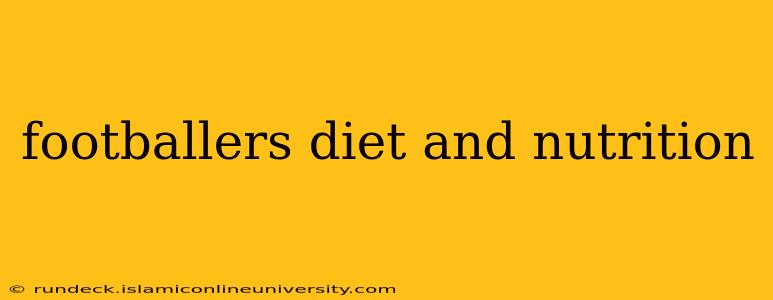Professional footballers, at the peak of physical prowess, require a meticulously planned diet and nutrition strategy to optimize performance, recovery, and overall well-being. Their nutritional needs go beyond the average person, demanding a precise balance of macronutrients, micronutrients, and hydration to fuel intense training sessions, matches, and rapid recovery. This comprehensive guide delves into the key aspects of a footballer's diet, addressing common questions and providing actionable insights.
What are the key components of a footballer's diet?
A footballer's diet should prioritize a balanced intake of carbohydrates, proteins, and healthy fats.
-
Carbohydrates: These are the body's primary energy source, crucial for fueling high-intensity training and matches. Complex carbohydrates, found in whole grains, fruits, and vegetables, provide sustained energy release, preventing energy crashes. Simple carbohydrates, like those in fruits and some dairy products, offer a quick energy boost before or during intense activity.
-
Proteins: Essential for muscle growth, repair, and recovery, proteins are vital for footballers. Lean protein sources like chicken, fish, lean beef, eggs, beans, and lentils should form the cornerstone of their diet. Sufficient protein intake minimizes muscle breakdown and promotes efficient recovery after strenuous activity.
-
Healthy Fats: Contrary to popular belief, healthy fats are essential for hormone production, cell function, and overall health. Sources like avocados, nuts, seeds, and olive oil provide essential fatty acids that support optimal bodily functions and reduce inflammation.
What foods should footballers avoid?
Just as crucial as what to include, understanding which foods to avoid is equally vital. Processed foods, sugary drinks, excessive saturated and trans fats, and refined carbohydrates should be minimized or eliminated. These foods often lack nutritional value and can contribute to weight gain, inflammation, and reduced performance.
How much water should a footballer drink daily?
Hydration is paramount for athletic performance. Dehydration can significantly impair performance, increase the risk of injury, and hinder recovery. Footballers should aim for a consistent intake of water throughout the day, well before, during, and after training and matches. The exact amount varies based on factors like body weight, climate, and intensity of activity, but generally, they need to drink more than the average person.
What are the best foods to eat before a game?
Pre-game meals should provide readily available energy without causing digestive discomfort. Complex carbohydrates combined with a moderate amount of protein are ideal. Examples include oatmeal with berries and nuts, whole-wheat toast with avocado, or a chicken salad sandwich on whole-grain bread. The meal should be consumed 2-3 hours before the game to allow for digestion.
What are the best foods to eat after a game?
Post-game nutrition focuses on replenishing glycogen stores and repairing muscle tissue. A combination of carbohydrates and protein is crucial. Examples include smoothies with protein powder and fruit, Greek yogurt with granola, or a lean protein source with sweet potato. Consuming this meal within 30-60 minutes post-game optimizes recovery.
How important is sleep in a footballer's diet and nutrition plan?
Sleep is often overlooked but is equally important as diet and training. Adequate sleep (7-9 hours per night) allows for optimal muscle recovery, hormone regulation, and cognitive function. Poor sleep can significantly hinder performance and increase the risk of injury.
What role do supplements play in a footballer's diet?
While a balanced diet should provide most necessary nutrients, some footballers may benefit from targeted supplementation under the guidance of a registered dietitian or sports nutritionist. Supplements might include creatine for increased strength and power, protein powder for enhanced muscle recovery, or vitamin D for bone health. It's crucial to avoid unnecessary or unregulated supplements.
What are common nutritional mistakes footballers make?
Common mistakes include neglecting hydration, consuming excessive processed foods, not prioritizing sufficient protein intake, and failing to plan meals appropriately around training schedules. Ignoring the importance of sleep and neglecting individual dietary needs are also prevalent issues.
Disclaimer: This information is for general knowledge and informational purposes only, and does not constitute medical advice. It is essential to consult with a registered dietitian or sports nutritionist for personalized dietary guidance tailored to individual needs and training schedules. They can assess individual requirements and create a plan that promotes optimal health and athletic performance.
